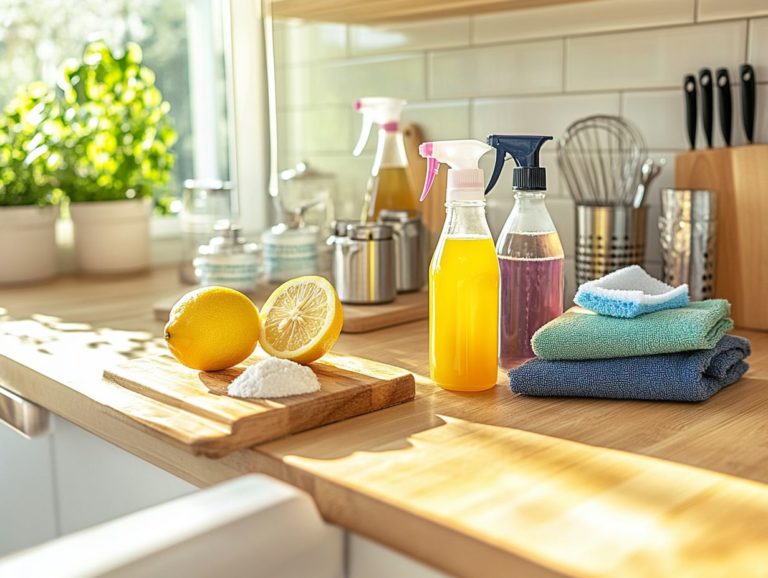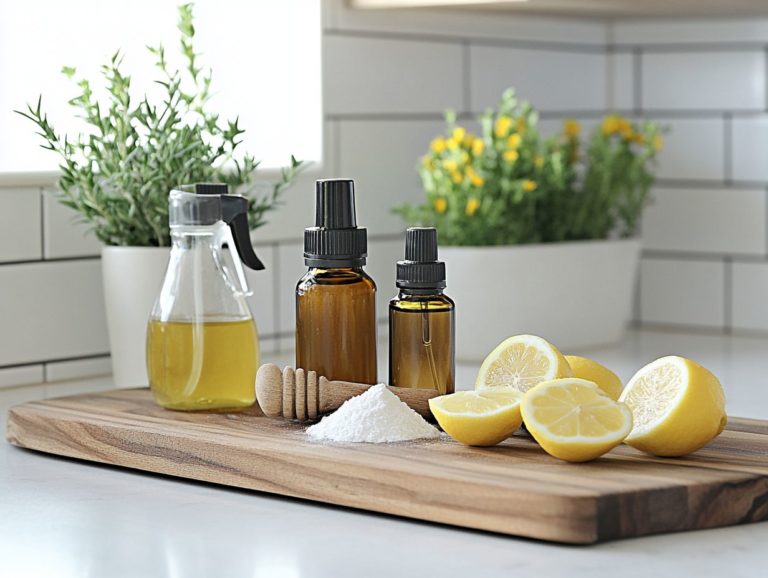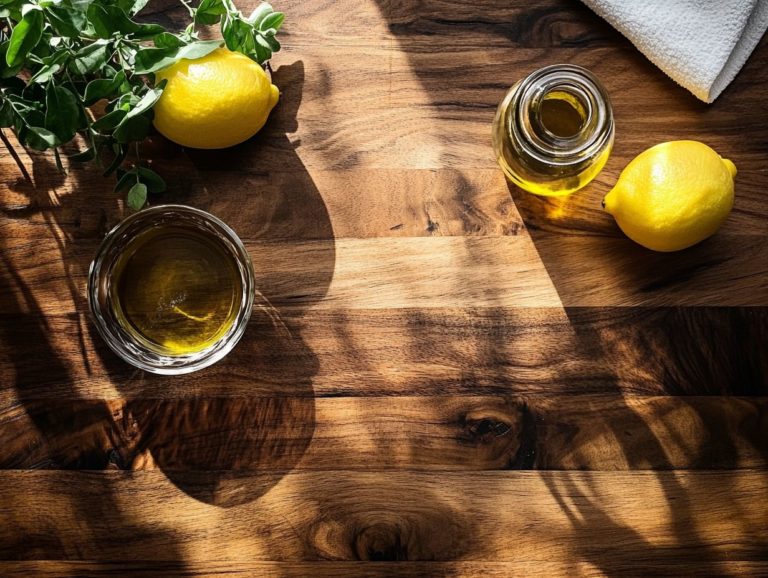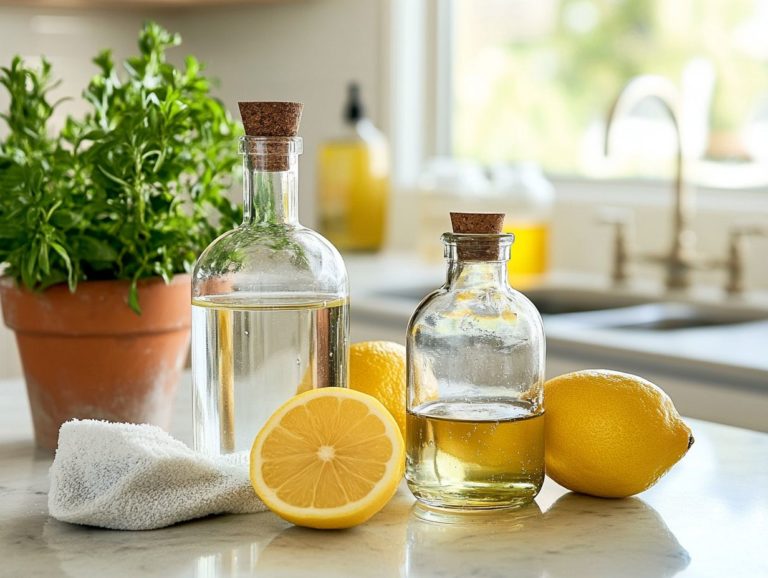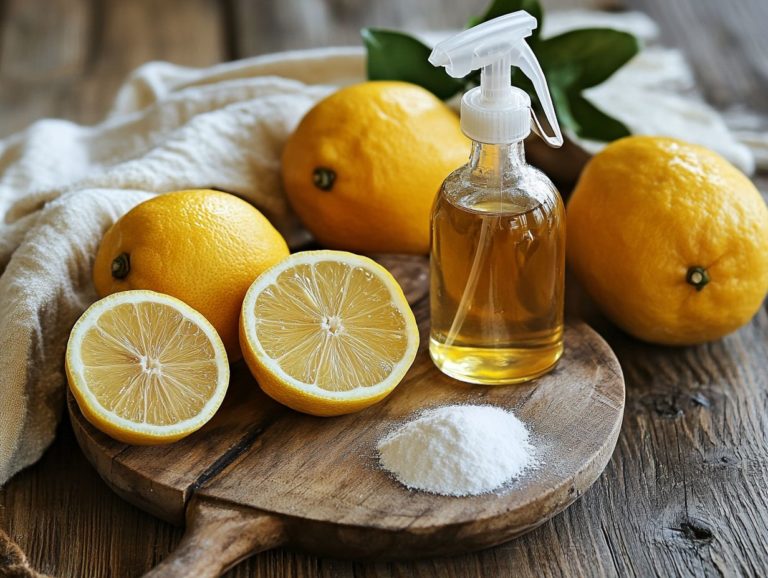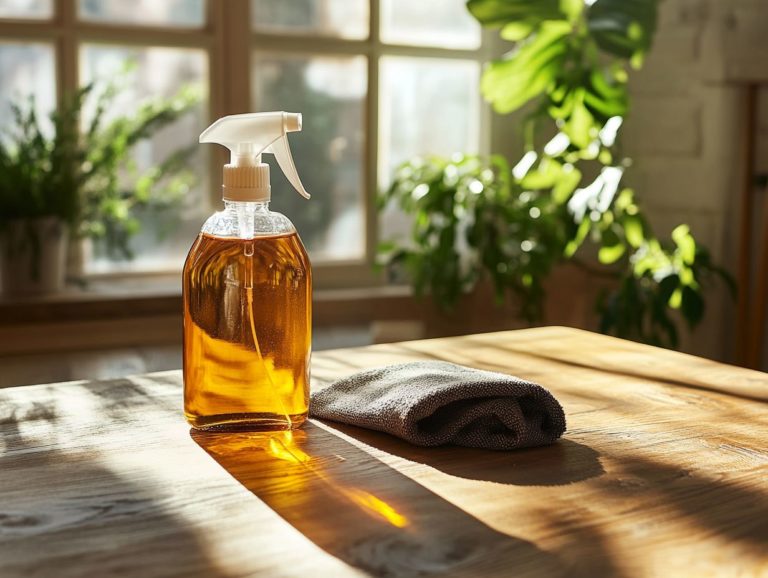5 Essential Steps for Making Cleaners at Home
In a world that is becoming increasingly conscious of the harmful effects of commercial cleaning products, opting to create your own natural cleaners at home emerges as a sustainable and healthier choice.
This guide will take you through five essential steps to craft effective homemade cleaners, guiding you from the initial gathering of ingredients to the customization of recipes tailored to your unique cleaning needs.
Uncover the advantages of using natural ingredients, explore straightforward recipes, and understand important safety precautions that will ensure your cleaning routine is both effective and eco-friendly.
Immerse yourself in this journey and elevate your cleaning habits to a new standard.
Contents
- Key Takeaways:
- 1. Gather Necessary Ingredients and Supplies
- 2. Research and Understand the Properties of Each Ingredient
- 3. Follow Recipes and Measurements Carefully
- 4. Store Properly and Label Clearly
- 5. Test and Adjust Recipes to Suit Personal Needs
- Why Make Cleaners at Home Instead of Buying Them?
- What Are the Benefits of Using Natural Cleaners?
- What Are Some Common Ingredients Used in Homemade Cleaners?
- What Are Some Simple Recipes for Homemade Cleaners?
- How Can One Customize Homemade Cleaners for Different Cleaning Needs?
- What Are Some Safety Precautions to Keep in Mind When Making and Using Homemade Cleaners?
- Frequently Asked Questions
- What are the 5 essential steps for making cleaners at home?
- Why is it important to gather ingredients before making cleaners at home?
- How do I properly measure and mix ingredients for homemade cleaners?
- What can I do if my homemade cleaner isn t cutting it?
- How should I store homemade cleaners?
- Are there any safety precautions I should take when making and using homemade cleaners?
Key Takeaways:
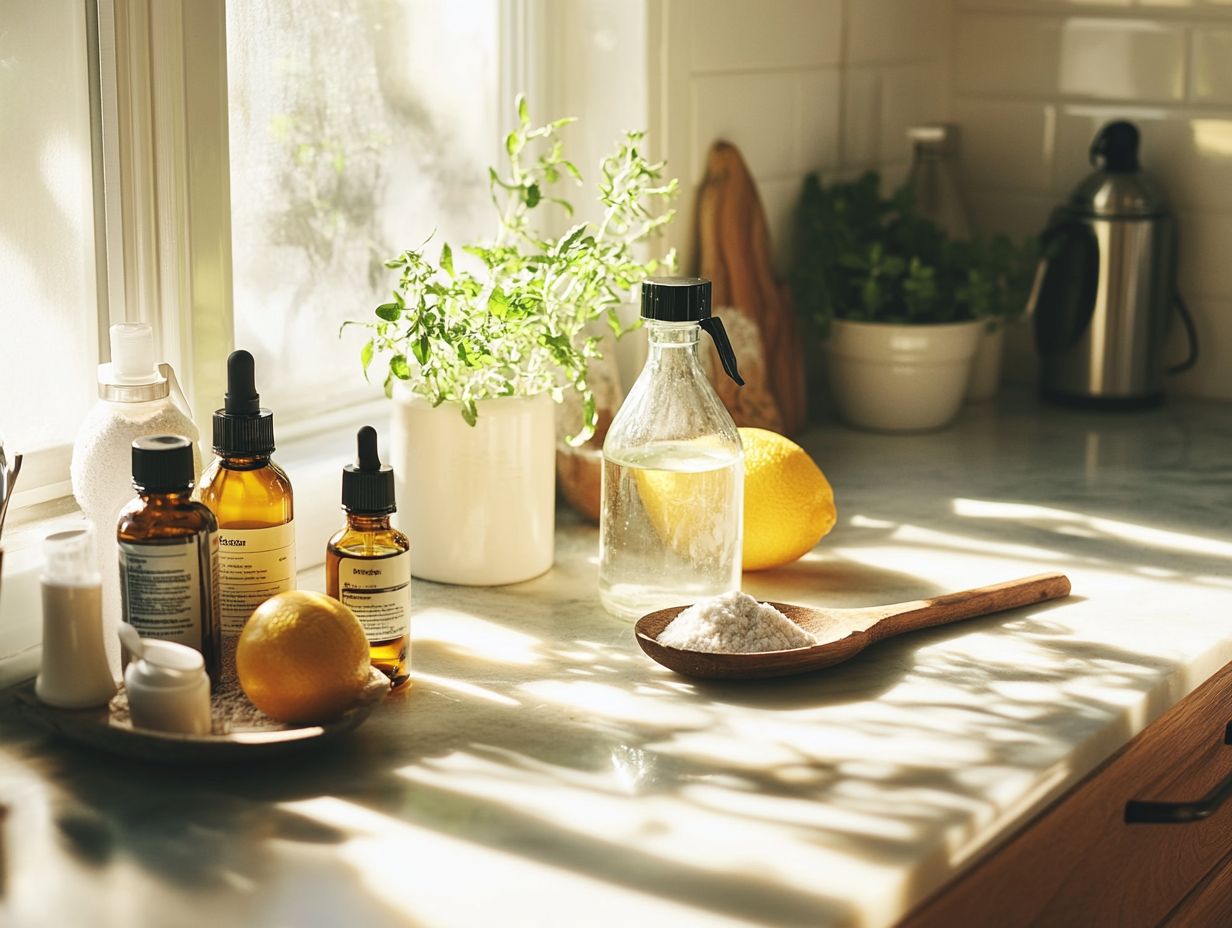
- Gather all necessary ingredients and supplies before starting to ensure a successful homemade cleaner.
- Understand the properties of each ingredient for effective and safe cleaning.
- Follow recipes and measurements carefully to avoid any potential accidents or ineffective results.
- Properly store and label homemade cleaners to ensure safe and organized usage.
- Test and adjust recipes to suit personal needs and preferences for effective and customized cleaning solutions.
1. Gather Necessary Ingredients and Supplies
To create effective and safe homemade cleaning solutions, gather the necessary ingredients and supplies. Stock up on household items like white vinegar, baking soda, and essential oils.
With these items at your disposal, you can tackle a range of cleaning tasks around your home, from cutting through grease and stains to freshening the air with delightful natural scents. It s vital to consider the specific types of cleaners you intend to create, such as an all-purpose cleaner or a specialized natural stone cleaner, which might require additional supplies like dish soap or rubbing alcohol.
Understanding the role of each ingredient is key to making effective cleaners. White vinegar serves as a powerful disinfectant, while baking soda acts as a gentle abrasive that can easily lift stubborn grime. Essential oils not only add fragrance but also have antimicrobial properties that help keep surfaces hygienic, making them excellent companions in your homemade concoctions.
Get creative! Experiment with different combinations to craft tailored cleaning sprays that meet the unique needs of various surfaces and challenges. Embracing these natural ingredients promotes a healthier living environment and minimizes your exposure to harmful chemicals, making this approach eco-friendly and safe for households, particularly those with children or pets.
2. Research and Understand the Properties of Each Ingredient
Understanding the properties of each ingredient in your homemade cleaning solutions is essential. For instance, the acidity of white vinegar and the grease-cutting power of baking soda can significantly enhance the effectiveness of your cleaning sprays while ensuring safety throughout your home.
By incorporating essential oils like tea tree or lavender, you not only introduce a delightful fragrance to your cleaning mix but also harness their natural antibacterial properties, which are invaluable for maintaining hygienic surfaces.
Rubbing alcohol is a standout ingredient, serving as a potent disinfectant that effectively tackles germs and viruses on various surfaces, making it your trusted ally for sanitizing frequently touched areas.
As you utilize these ingredients, remember to prioritize proper ventilation and avoid mixing certain substances that could produce harmful fumes. Store all cleaning solutions out of reach of children and pets to ensure safety and a healthy environment in your home.
3. Follow Recipes and Measurements Carefully
When you create homemade cleaning solutions, paying close attention to the recipes and measurements is essential. This careful method ensures your cleaning sprays are effective and safe, delivering excellent results for various tasks around your home.
Precision in measurements is vital to the chemistry of cleaning. For example, a standard ratio for all-purpose cleaners involves mixing one part vinegar with one part water. This combination uses vinegar’s natural acidity to cut through grime without harming surfaces.
Conversely, specialized cleaners may require different ratios. For instance, mixing two cups of water with one cup of baking soda creates a powerful stain remover.
As you craft these solutions, keep safety in mind never mix vinegar with bleach; it creates toxic gases, so avoid doing this!
By following these guidelines, you enhance the effectiveness of your homemade cleaners and create a safe environment for everyone in your household.
4. Store Properly and Label Clearly
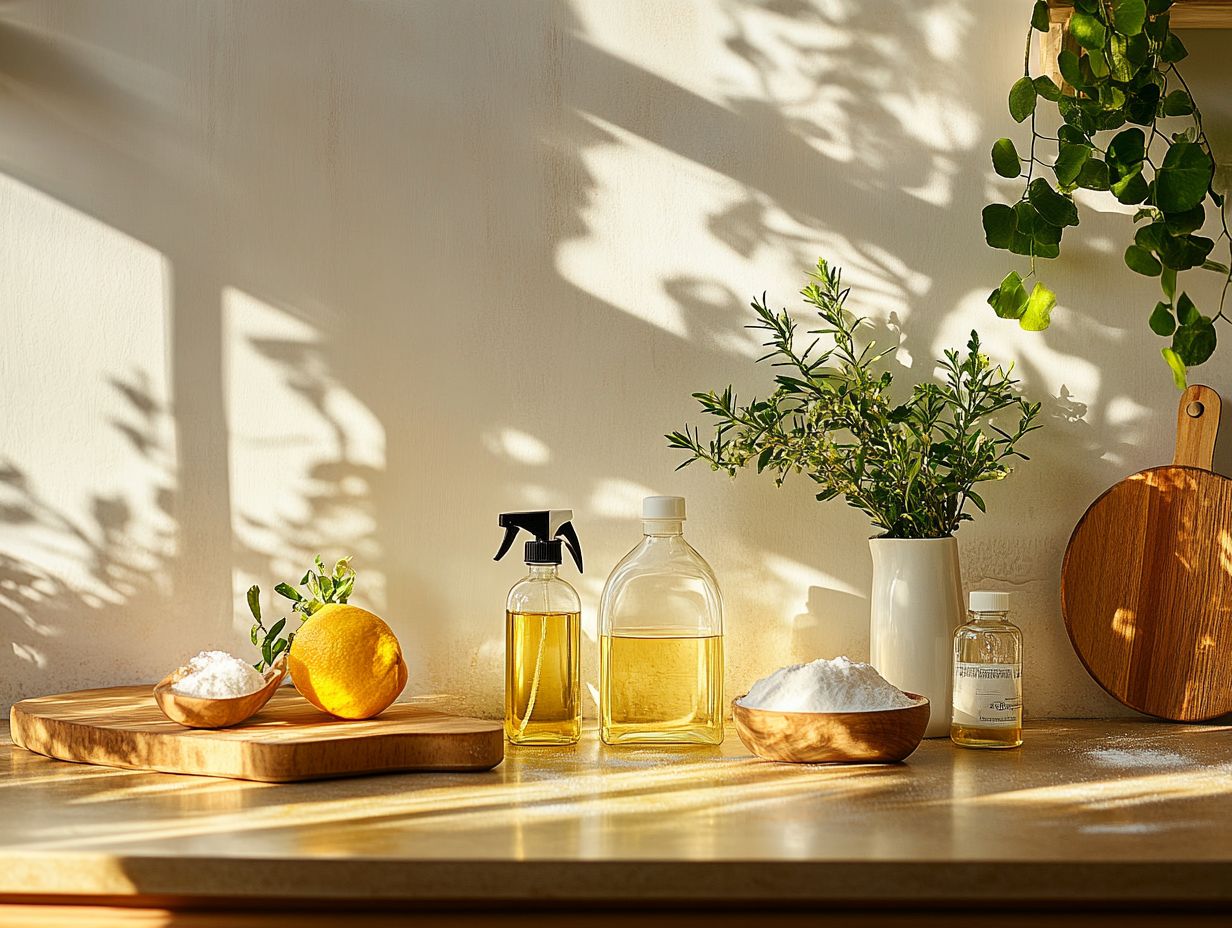
Proper storage and clear labeling of your homemade cleaning sprays and solutions are crucial for safety and easy access, especially when using potent ingredients like rubbing alcohol or essential oils.
Choosing the right containers is equally important; opt for glass or high-quality plastic that can withstand various formulations. Avoid old food containers, as residues could compromise the effectiveness of your cleaning products.
Store these solutions in a cool, dry place away from direct sunlight, which can break down the chemicals over time. Clearly labeling each container not only prevents accidental misuse but also allows for quick identification of each cleaner’s purpose.
Don t forget to include the ingredients and any necessary precautions. This organized approach streamlines your cleaning routine and fosters a safer home environment.
5. Test and Adjust Recipes to Suit Personal Needs
Testing and adjusting your own homemade cleaning recipes allows you to tailor your cleaning sprays to meet your specific needs, ensuring both effectiveness and satisfaction in your cleaning routine.
To achieve optimal results, experiment with various surfaces, including glass, wood, and ceramic. Each surface may require its own unique formulation. For example, a stronger solution might be necessary for grimy kitchen surfaces, while a gentler blend is better for delicate items like mirrors.
Adjusting ingredient ratios based on your cleaning challenges can make a significant difference. Adding components like lemon rind enhances the fresh scent and offers antibacterial benefits, while rosemary sprigs can infuse your space with a delightful aroma.
Remember, testing is an integral part of the process. Reflect on your experiences and refine the recipes as needed to achieve peak performance.
Why Make Cleaners at Home Instead of Buying Them?
Creating your own cleaning sprays and solutions offers many advantages. You ll love how this method is cost-effective, significantly reducing your expenses while cutting down on environmental impact.
You gain complete control over the ingredients you use, ensuring a safer cleaning experience for your family and pets. This approach minimizes exposure to harmful chemicals commonly found in store-bought cleaners.
- Save money over time with DIY cleaning solutions.
- Reduce plastic waste and cut down on the release of toxic substances.
- Tailor your solutions to meet your specific household needs and preferences.
Unlike conventional cleaners packed with harsh chemicals that can irritate respiratory systems and skin, natural ingredients like vinegar, baking soda, and essential oils provide effective cleaning power while prioritizing the health and safety of every household member, including pets.
Start creating your own cleaners today for a fresher, safer home!
What Are the Benefits of Using Natural Cleaners?
Using natural cleaners made from home recipes offers a wealth of advantages, including enhanced safety for you and your family, impressive effectiveness in tackling a variety of stains and spills, and a positive impact on the environment by reducing your reliance on harsh chemicals.
These eco-friendly alternatives minimize your exposure to toxic ingredients often lurking in commercial products. They harness the power of common household staples, like baking soda and white vinegar. For example, a straightforward blend of white vinegar and water can cut through grease on your kitchen counters with ease. The mild abrasive qualities of baking soda make it perfect for scrubbing sinks and bathtubs without leaving a scratch.
By eliminating harsh chemicals from your cleaning routine, you significantly lower the risk of allergic reactions that can be triggered by synthetic fragrances and irritants. Choosing natural ingredients enhances your personal well-being and contributes to a cleaner environment. These materials break down naturally in the environment, reducing your ecological footprint while keeping your home spotless.
What Are Some Common Ingredients Used in Homemade Cleaners?
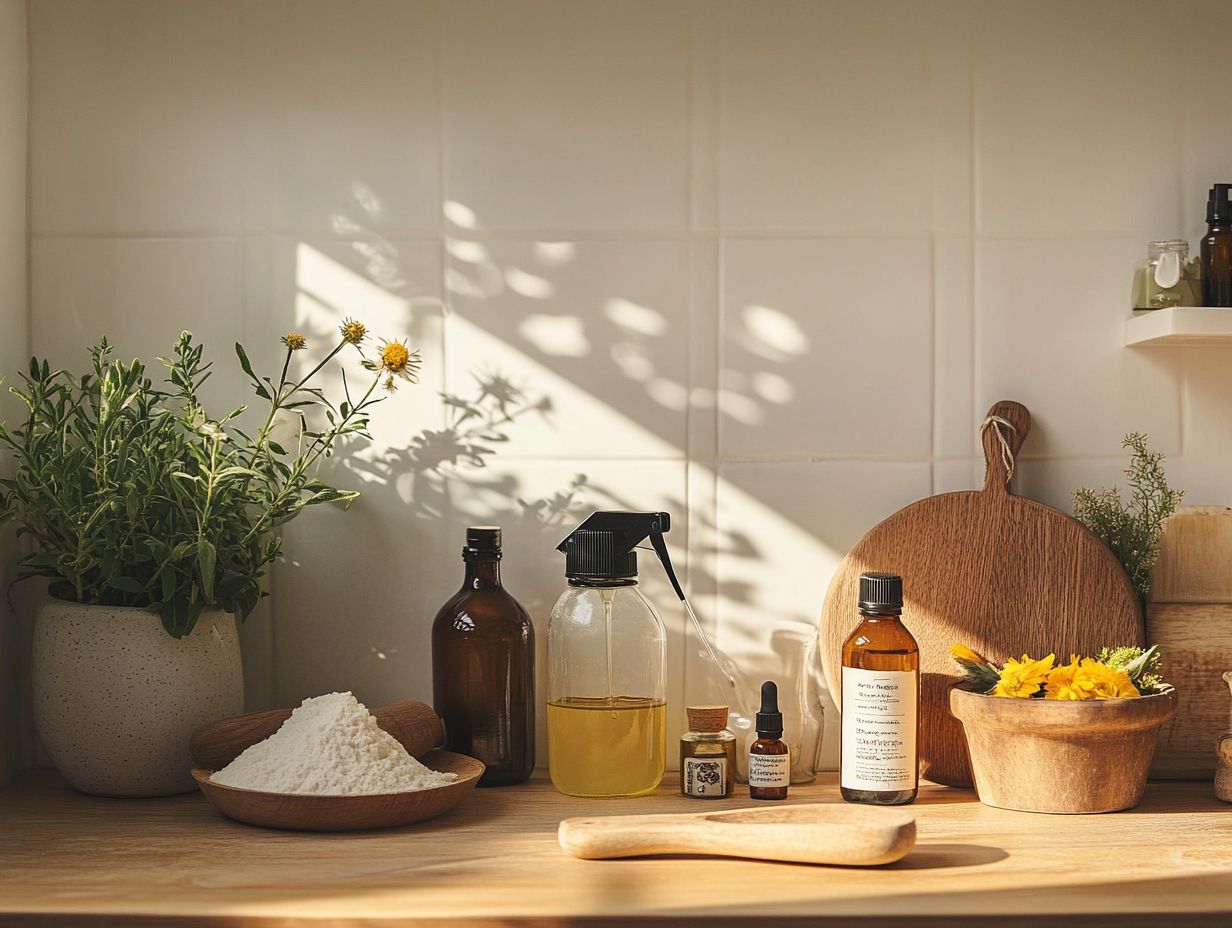
Common ingredients used in homemade cleaners include white vinegar, baking soda, dish soap, and essential oils. Each of these components adds unique properties to your cleaning solutions, enhancing both their effectiveness and safety.
White vinegar is remarkable for its ability to cut through stubborn grease and eliminate mineral deposits, making it ideal for kitchen surfaces and appliances. Baking soda serves as a gentle abrasive, lifting stains and odors effortlessly perfect for scrubbing countertops or freshening up carpets. Dish soap, known for its grease-fighting capabilities, is your go-to for tackling everything from kitchen spills to greasy stovetops.
Don t overlook essential oils they infuse your cleaning solutions with delightful fragrances and bring antibacterial properties, making them excellent for sanitizing surfaces. By mixing and matching these ingredients, you can easily create your own cleaning solutions that meet your needs!
What Are Some Simple Recipes for Homemade Cleaners?
Here are some straightforward recipes for homemade cleaners that you can whip up right in your kitchen. You ll find an all-purpose cleaner, a glass cleaner, and a carpet stain remover, all designed to meet your cleaning needs without resorting to harmful chemicals.
These recipes are easy to follow and make use of common ingredients you likely already have on hand. They are both budget-friendly and eco-conscious. Each cleaner is easily adaptable to various surfaces or specific stains, allowing you to customize your cleaning routine effortlessly.
Whether you re dealing with greasy kitchen countertops, streaky windows, or pesky carpet stains, these powerful solutions will transform your cleaning routine today!
By tweaking the proportions or adding a few drops of essential oils, you can enhance these cleaners for an even more delightful fragrance and targeted effectiveness, ensuring your home remains fresh and welcoming.
How Can One Customize Homemade Cleaners for Different Cleaning Needs?
Customizing your own homemade cleaners for various cleaning tasks is remarkably simple. It enables you to craft solutions with specific natural ingredients that effectively address everything from kitchen grease to sensitive stone surfaces.
If stubborn kitchen grease is your challenge, add a bit more baking soda to boost cleaning power, making it a breeze to scrub away those tough residues. To refresh the air or surfaces, adding a few drops of lemon essential oil not only brings a delightful fragrance but also imparts natural antibacterial properties.
When cleaning the bathroom, combining vinegar with water becomes your secret weapon against soap scum and mineral deposits, ensuring a sparkling clean without the need for harsh chemicals. Each of these adjustments enables you to create tailored solutions that perfectly align with your cleaning needs.
What Are Some Safety Precautions to Keep in Mind When Making and Using Homemade Cleaners?
When you re crafting and using homemade cleaners, it s imperative to adhere to safety precautions to safeguard both your health and that of your pets. This is especially important when dealing with strong ingredients like rubbing alcohol and essential oils, which are concentrated plant extracts that can be very strong and should be used carefully.
Proper storage is essential. Ensure that these cleaners are kept in clearly labeled, child-proof containers to prevent any accidental ingestion or misuse. Take the time to thoroughly read usage recommendations to grasp any potential reactions between different ingredients. Combining certain substances can lead to toxic gases that can hurt you if inhaled or ineffective mixtures.
Always prioritize working in well-ventilated areas. Remember, never mix bleach with ammonia, as this can produce toxic gases. Above all, keep all cleaning products out of reach of curious children and pets after all, their safety should always be your top priority!
Frequently Asked Questions
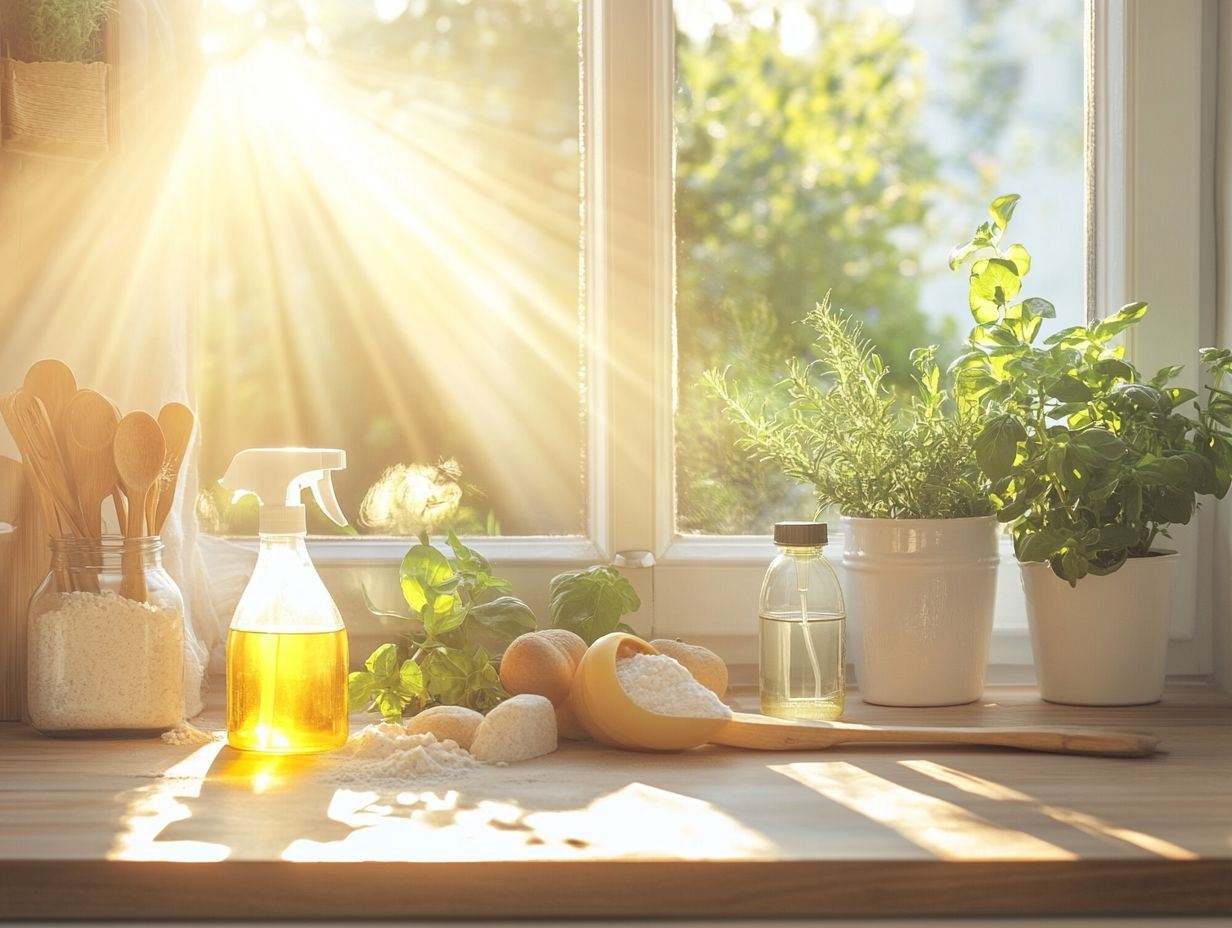
What are the 5 essential steps for making cleaners at home?
The 5 essential steps for making cleaners at home are: gathering ingredients, measuring and mixing, testing and adjusting, storing the cleaner, and using it safely.
Why is it important to gather ingredients before making cleaners at home?
Gathering ingredients beforehand ensures that you have all the necessary materials and prevents interruptions during the mixing process.
How do I properly measure and mix ingredients for homemade cleaners?
To ensure accuracy, use measuring cups and spoons to measure out the ingredients, and mix them together in a clean and designated container.
What can I do if my homemade cleaner isn t cutting it?
If the cleaner doesn’t work as intended, try adjusting the proportions of the ingredients or adding in additional ingredients to enhance its cleaning power.
How should I store homemade cleaners?
Store homemade cleaners in a labeled and sealed container away from direct sunlight and heat. Keep them out of reach of children and pets.
Are there any safety precautions I should take when making and using homemade cleaners?
Yes! Always wear gloves and a mask when handling and mixing ingredients. Also, avoid mixing certain ingredients together as they can create harmful fumes. Always test the cleaner in a small area before using it on a larger surface.

